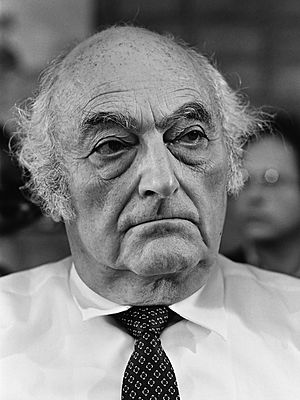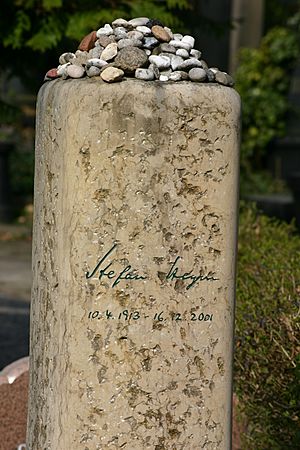Stefan Heym facts for kids
Quick facts for kids
Stefan Heym
|
|
|---|---|

Stefan Heym in 1982
|
|
| Born | Helmut Flieg 10 April 1913 Chemnitz, Kingdom of Saxony, German Empire |
| Died | 16 December 2001 (aged 88) Ein Bokek, Tamar Regional Council, Southern District, Israel |
| Pen name | Stefan Heym, Melchior Douglas, Gregor Holm |
| Occupation | Writer |
| Citizenship | German, American |
| Alma mater | University of Chicago |
| Period | 1938–2003 |
| Notable awards | Heinrich Mann Prize 1953 National Prize of East Germany 1959 2nd Class Jerusalem Prize 1993 |
Helmut Flieg was a German writer. He is best known by his pen name, Stefan Heym. He lived in the United States for a time. He was part of a special group called the Ritchie Boys during World War II. In 1952, he moved back to Germany. He lived in East Germany, which was a separate country from 1949 to 1990.
Stefan Heym wrote books in both English and German. He published his works in Germany and other countries. He often criticized the East German government. But he always believed in socialism, a system where the community owns and controls production. He won several awards for his writing. These included the Heinrich Mann Prize in 1953 and the Jerusalem Prize in 1993.
Contents
Biography
|
Stefan Heym
|
|
|---|---|
| Oldest Member of Parliament | |
| In office 10 November 1994 – 31 October 1995 |
|
| Preceded by | Alfred Dregger |
| Succeeded by | Alfred Dregger |
| Member of the Bundestag for Berlin-Mitte – Prenzlauer Berg |
|
| In office 10 November 1994 – 31 October 1995 |
|
| Preceded by | Wolfgang Thierse |
| Succeeded by | Hanns-Peter Hartmann |
| Personal details | |
| Political party | independent |
Early Life and Education
Helmut Flieg was born in Chemnitz, Germany. His family was Jewish. From a young age, he was against fascism. Fascism is a political system where a strong leader and government control everything.
In 1931, local Nazis forced him to leave his school. This happened because he wrote a poem against war. He finished school in Berlin. Then he started studying media there. After a big fire at the German Parliament building in 1933, he fled to Czechoslovakia. This is where he started using the name Stefan Heym.
In Czechoslovakia, he worked for German newspapers. He also had some articles translated into Czech. He used different pen names during this time. These included Melchior Douglas, Gregor Holm, and Stefan Heym.
Time in the United States
In 1935, Stefan Heym received a scholarship. He moved to the United States to study at the University of Chicago. He finished his degree in 1936. From 1937 to 1939, he worked in New York. He was the editor of a German-language newspaper. This newspaper was connected to the Communist Party in the USA.
After the newspaper closed, Heym became a freelance writer. He wrote in English. His first novel, Hostages (1942), became a bestseller.
From 1943, Heym helped with the World War II effort. He became a U.S. citizen. He joined the Ritchie Boys. This was a special unit that used words and ideas to influence enemy soldiers. Heym wrote texts for leaflets, radio, and loudspeakers. These experiences later inspired his novel The Crusaders.
After the war, Heym worked as an editor for important newspapers in Germany. But he was very critical of Nazism. He also refused to spread doubts about the Soviet Union. Because of this, he was sent back to the U.S. in 1945. In 1951, he worried about being investigated by the government. So, he left the United States with his American wife, Gertrude Gelbin.
He worked as a freelance writer again. In 1952, he returned his American military awards. This was a protest against the Korean War. He moved to Prague first. Then, in 1953, he moved to German Democratic Republic (GDR), also known as "East Germany." The East German government gave him back his German citizenship.
Life in East Germany
In East Germany, Stefan Heym was first treated very well. This was because he was an antifascist who had returned. He lived in a house provided by the state. From 1953 to 1956, he worked for a newspaper. After that, he mostly worked as a freelance writer. In his early years in East Germany, Heym supported the government. He wrote socialist novels. His English books were published by a special company. German translations were also printed in large numbers.
Problems with the East German government started around 1956. His book about the uprising in 1953, called Five Days in June, was not allowed to be published. Tensions grew after 1965. A top leader, Erich Honecker, criticized Heym. In 1969, Heym was fined for publishing his novel Lassalle in West Germany. This was against rules about money exchange.
Even with these problems, Heym could still travel outside East Germany. For example, he visited the U.S. in 1978. His books continued to be published in East Germany, but in smaller numbers.
In 1976, Heym was one of the writers who signed a petition. They protested against another writer, Wolf Biermann, being forced to leave East Germany. After this, Heym could only publish his works in West Germany. He started writing more in German. In 1979, he was fined again for money exchange violations. He was also removed from the East German Authors Association.
Heym supported the idea of German reunification as early as 1982. This meant East and West Germany becoming one country again. In the 1980s, he supported the civil rights movement in East Germany. He gave speeches at protests in 1989.
After Germany Reunited
After Germany became one country again, Heym was critical. He felt that East Germans were not treated fairly. He believed in a socialist way of life for the reunited Germany. In the 1994 elections, Heym ran as an independent candidate. He won a seat in the Bundestag, which is the German Parliament.
As the oldest member, he gave the opening speech in Parliament in November 1994. But he resigned in October 1995. He protested against a plan to raise pay for members of Parliament. In 1997, he signed a declaration. It asked for a special government alliance between two parties.
Stefan Heym died suddenly in Israel in 2001. He was 88 years old. He was attending a conference about another famous writer, Heinrich Heine.
Heym received many honors. He got honorary doctorates from universities. He also became an honorary citizen of Chemnitz, his hometown. He won the Jerusalem Prize in 1993 for his writing. This award was for "the freedom of the individual in society." He also received a peace medal. He was buried in the Weißensee Cemetery.
Works
Written in English
- Nazis in the U.S.A., New York 1938
- Hostages, New York 1942
- Of Smiling Peace, Boston 1944
- The Crusaders, Boston 1948
- The Eyes of Reason, Boston 1951
- Goldsborough, Leipzig 1953
- The Cannibals and Other Stories, Berlin 1958
- A visit to Soviet science, New York 1959
- The Cosmic Age, New Delhi 1959
- Shadows and Lights, London 1963
- The Lenz Papers, London 1964 – This book is about the failed revolutions in Germany in 1848.
- The Architects written around 1963–1965, published in German in 2000.
- Uncertain Friend, London 1969
- The King David Report, New York 1973 – This book shares many stories about King David's life that are not in the Bible.
- The Queen against Defoe, London 1975
- Five Days in June, London 1977 (about the 1953 uprisings in East Germany)
- Collin, London 1980
Written in German
- Collin (1979)
- Der kleine König, der ein Kind kriegen mußte und andere neue Märchen für kluge Kinder (1979) (The Little King Who Had to Have a Child and Other New Fairy Tales for Clever Children)
- Ahasver (1981) – published in English as The Wandering Jew (1984)
- Atta Troll. Versuch einer Analyse (1983)
- Schwarzenberg (1984) – a novel about the Free Republic of Schwarzenberg
- Reden an den Feind (1986) (Speeches to the Enemy)
- Nachruf (1988) – his autobiography
- Meine Cousine, die Hexe und weitere Märchen für kluge Kinder (1989) (My Cousin, the Witch, and More Fairy Tales for Clever Children)
- Auf Sand gebaut (1990) – short stories
- Stalin verlässt den Raum (1990) – political writings
- Einmischung (1990) (Interference)
- Filz (1992)
- Radek (1995)
- Der Winter unsers Missvergnügens (1996) (The Winter of Our Discontent)
- Immer sind die Weiber weg und andere Weisheiten (1997) (The Women Are Always Gone and Other Wisdoms)
- Pargfrider (1998)
- Immer sind die Männer schuld (2002) (It's Always the Men's Fault)
- Offene Worte in eigener Sache (2003) (Open Words on My Own Behalf)
See also
 In Spanish: Stefan Heym para niños
In Spanish: Stefan Heym para niños
 | Laphonza Butler |
 | Daisy Bates |
 | Elizabeth Piper Ensley |


